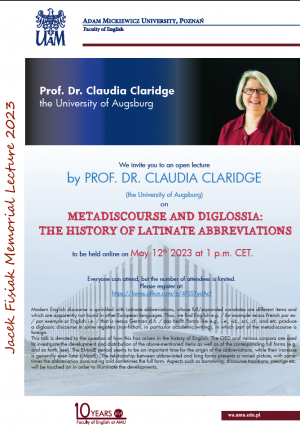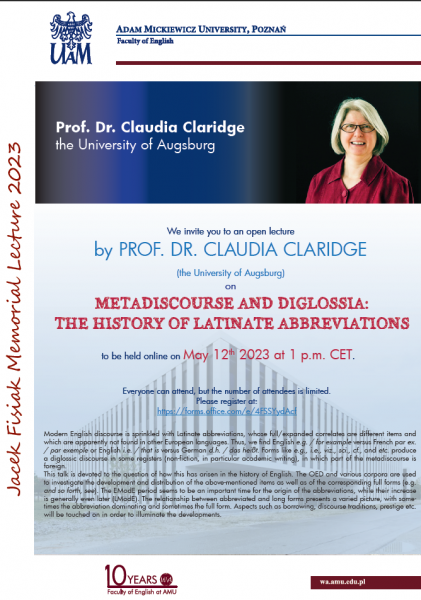The Department of the History of the English Language cordially invites everybody to the third Jacek Fisiak Memorial Lecture, devoted to the memory of Professor Jacek Fisiak, the founding father of English studies in Poland and the godfather of Polish studies on the history of the English language. Our distinguished speaker this year will be Prof. Dr Claudia Claridge from the University of Augsburg, who will talk about Metadiscourse and Diglossia: The History of Latinate abbreviations.
The lecture will be held online via the Zoom platform on Friday, May 12th, at 1 p.m. C.E.T. Attendance is free, if you want to attend, you are asked to register via an online form which can be found at
https://forms.office.com/e/4FSSYydAcf
Modern English discourse is sprinkled with Latinate abbreviations, whose full/expanded correlates are different items and which are apparently not found in other European languages. Thus, we find English e.g. / for example versus French par ex. / par example or English i.e. / that is versus German d.h. / das heißt. Forms like e.g., i.e., viz., sci., cf., etc. produce a diglossic discourse in some registers (non-fiction, in particular, academic writing), in which part of the metadiscourse is foreign.
This talk is devoted to the question of how this has arisen in the history of English. The OED and various corpora are used to investigate the development and distribution of the above-mentioned items as well as of the corresponding full forms (e.g. and so forth, see). The EModE period seems to be an important time for the origin of the abbreviations, while their increase is generally even later (LModE). The relationship between abbreviated and long forms presents a varied picture, with sometimes the abbreviation dominating and sometimes the full form. Aspects such as borrowing, discourse traditions, prestige etc. will be touched on in order to illuminate the


